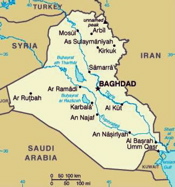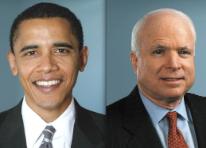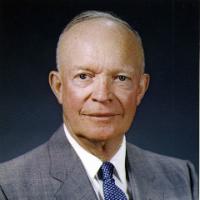I’ve got to agree with Andrew Sullivan on this one. We still don’t know how the final chapter on the Surge will turn out, because we still don’t know how the final chapter on Iraq will turn out. Setting aside the problems of causality (the Anbar Awakening that preceded it, the sectarian cleansing that had been largely accomplished before it, etc.), I acknowledge that the decision to double down and dig in — which struck me as a desperate measure with “last ditch” written all over it — obviously struck some of the actors in Iraq quite differently. But as […]
Iraq Archive
Free Newsletter
Meanwhile, the debate over the American military engagement in Iraq has been reduced to the choice between maintaining or withdrawing our troops. Ignored is the notion that we can maintain troop levels while disengaging politically (e.g. disengaged bases) or that, conversely, we can withdraw our troops while significantly ramping up our political engagement. The latter option is what this report (.pdf) by the Task Force for a Responsible Withdrawal from Iraq proposes as the basis for a complete withdrawal of American forces within 12-18 months, beginning with a modified UN mandate that internationalizes the Iraqi aid and support mission in […]
Dr. iRack over at Abu Muqawama has emerged recently as an authoritative analyst of the Iraq War (and everything that term implies), so I recommend this rundown of the current situation that he posted over the weekend. Without getting too much into the details of his post (which is pretty comprehensive), it’s reassuring to see that I’m not the only one who finds it difficult to make any meaningful sense out of the various narratives and counter-narratives that are now coming out of Iraq. Glass half-full or glass half-empty depends to a great deal on the observer. But I’d venture […]
A few months ago, a friend here in Paris asked me how Americans could consider the Iraq War a failure when it had accomplished its principle strategic goal, namely securing Iraqi oil for American consumption. I argued that the rise in crude oil prices had largely offset whatever advantage had accrued from securing access to it, and that the missing element to his argument was American oil companies — as opposed to the Iraqi government — actually profiting from the oil. As Andrew Sullivan points out here, that missing element will very shortly no longer be missing, making the case […]

After the battles of Basra and Mosul, Iraq’s territorial integrity now faces another severe challenge on the constitutional front. With the U.N. Assistance Mission for Iraq having initiated rounds of talks to save the north from a potential cross-border war, the struggle over the future status of the northern city of Kirkuk has entered its decisive phase. Failure could lead to the ultimate disintegration of Iraq. The Kurdish Regional Government (KRG) currently enjoys constitutionally recognized authority over the three northern provinces of Erbil, Dohuk, and Sulaymaniyah. Yet it also enjoys de facto control over significant parts of Diyala, Kirkuk, and […]
Back in the mid-90’s, when I was working as an intervention counselor with adolescent gang members in Santa Cruz and Watsonville (Calif.), I once proposed paying the kids to join neighborhood watch groups. The logic was that by both offering them alternatives to illegal income and empowering them with a responsibility to protecting people in their neighborhoods as opposed to victimizing them, we could get them to buy into the system. Needless to say, my idea was shot down like a Georgian drone over Abkhazia by the head of the County Juvenile Probation Dept, to the general amusement of all […]

It’s a sign of the weakness of the Republican Party and its nominee that Sen. John McCain’s best chance of victory may lie in championing the hugely unpopular war in Iraq. Polls indicate that most Americans wish the war had never started, and would like to see American troops pulled out of the country sooner rather than later. At the same time, though, Americans have a much more positive impression of the conduct of the war since early 2007. The troop surge, which which began that January, saw not only a temporary increase in American troops but also the introduction […]
Interesting reading over at Abu Aardvark, aka Marc Lynch. A group of Sunni Awakening leaders visiting Washington offer their point of view on what future for progress in Iraq will require. Significantly, they emphasize the need to get the provincial and national elections right, something David Ucko argued here in WPR just a few weeks ago.

This year, American children born after the fall of the Berlin Wall, literally a generation ago, will vote in a presidential election for the first time. They will join a group of voters born and raised during the long struggle against communism and now entering retirement. On Feb. 12 of this year, the nation’s first baby boomer — born on January 1, 1946 — collected her first social security check. In 2008, the long shadow cast by the Cold War will finally start to recede. Both baby boomers and so-called “millennials” seek a president that can address the most obvious […]
There’s a growing meme that between battlefield defeats in Iraq, internal divisions and souring public opinion, al-Qaida is a hobbled enemy. While I don’t agree with all of his answers, I think that Walid Phares is asking some very important questions about just how to measure victory or defeat over al-Qaida. Essentially, Phares argues that all of the current progress is contingent on keeping a firm military bootprint on the regional pressure points that, if loosened, would allow al-Qaida to regroup, whether under its Bin Ladenist current or some other ideological replacement: As simple as that: if the United States […]
We often hear about the importance of the training component of counterinsurgency. Theoretically, the military endgame in Iraq and Afghanistan is not to defeat the insurgents so much as to empower the Iraqi and Afghan security forces to defeat the insurgents. The recent fighting in Basra but especially in Sadr City illustrates, among other things, both the importance of Iraqi units doing the fighting, as well as their limitations in doing so. Nevertheless the Army still doesn’t have a coordinated training program or doctrinal approach to military advisors. It’s a subject that’s getting more attention these days, and Kip over […]

Sen. Barack Obama’s promise to “immediately begin to remove our troops from Iraq” is the centerpiece of his campaign, and his straightforward stance on the war and vision of an endgame is the factor that arguably attracts most of his supporters. “When I am commander-in-chief,” he vows, without a hint of hedging or nuance, “I will set a new goal on Day One: I will end this war.” The U.S. has witnessed similar moments in presidential politics. In 1952, with the nation bogged down in a bloody and unpopular war on the Korean peninsula, Gen. Dwight Eisenhower campaigned on a […]
However stable or illusory it turns out to be, the improved security situation in Iraq has made calling for the withdrawal of American troops into an act of courage these days. I’m increasingly of the opinion that if ever there was a moment to wait and see how things develop, now would be it. But Monica Duffy Toft, in a CSM op ed, reminds us that there are longterm strategic costs for shortsighted optimism. Essentially, as this line of reasoning goes, all of the blood and treasure we’re investing in stabilizing Iraq is going to pay huge dividends down the […]

A CHANGING WORLD — The Trilateral Commission is made up of top leaders in politics, foreign policy, and finance from the United States, Western Europe, and Japan — hence the “tri” in the name. The group has a reputation for secretiveness and behind-the-scenes power in shaping world affairs. Formed during the Cold War, it is traditionally Western in outlook, influential rather than powerful, and discreet more than secretive. The Trilateral Commission emerged into the limelight when president elect Jimmy Carter, himself a member, lifted his foreign policy team wholesale from its ranks, including the former director Zbigniew Brzezinski. Corridors has […]
According to this Le Figaro account of Bernard Kouchner’s surprise weekend visit to Iraq, Iraqi President Jalal Talabani has begun referring to the current economic, political and security conditions as a “Baghdad spring.” There’s still some background signal noise, as well as both uncertain and contradictory data points, but as Andrew Sullivan rightly points out here, conditions on the ground have changed the political calculus in Washington. Kouchner’s visit and Le Monde’s claim that France will use its EU presidency to push for increased European involvement in Iraq suggest a line that should begin to get more attention, namely the […]
